-
Services
-
Software Project Delivery
-
Services
-
Solutions
-
Technologies
-
-
Network
-
Discover
-
Regions
-
Industries
-
Must-Read Guide
-
2025 Global Software Outsourcing Rates and Trends GuideDon't get left behind—discover the latest rates and strategies for success in the global software development outsourcing market in 2025.
-
-
-
Resources
-
Our Resources
-
New eBook
-
 The True Cost of Software DevelopmentHidden costs can wreck your budget. Our new eBook breaks down the true cost of outsourcing—get your copy to stay ahead.
The True Cost of Software DevelopmentHidden costs can wreck your budget. Our new eBook breaks down the true cost of outsourcing—get your copy to stay ahead.
-
-
Webinar On-Demand
-
Stop Chasing Low Hourly Rates: Unlock the True Value of Offshore DevelopmentReduce development costs without compromising quality.
-
-
Featured White paper
-
Unlock Offshore Success with Accelerance AlignDiscover how Accelerance Align helps businesses overcome software outsourcing challenges through expert guidance, cultural integration, and tailored strategies.
-
-
-
About
-
About Accelerance
-
Our History
-
Accelerance: Our HistoryThere's great talent everywhere and great teams everywhere, which is the basis of the Accelerance model.
-
-
Software Without Borders
-
New Episode Every Week!Tune into our podcast Software Without Borders, the essential listen for technology leaders and business owners in the software sector who crave insights from the industry’s top minds.
-
-
Andy's Book
-
Synergea: A Blueprint for Building Effective, Globally Distributed Teams in the New Era of Software DevelopmentPeople are first and locations are secondary when it comes to software development success.
-
-
January 16, 2025
Tech Talent Shortage Part 2: Five Cutting-Edge Technologies to Adopt
Written by: Accelerance Research Team
At Accelerance, we have identified two key trends related to emerging technologies that software outsourcing are embracing:
- Hyperspecialization: The need for businesses to go deep in technical areas to maintain a competitive edge, is challenging IT leaders' current skills sourcing strategies with no end in sight. Software development outsourcing is an increasingly popular way for IT leaders to find specific skilled programming teams that are in short supply. A group of proactive software outsourcing firms have geared up to meet this need.
- Tech Value Networks: As companies seek to digitally transform at a faster pace, they’re finding a traditional value chain approach just isn’t cutting it. In this shifting IT environment, more adaptive, distributed supplier ecosystems are becoming the new norm. It's the rise of what Accelerance calls the "Tech Value Network" - essentially a portfolio of pre-vetted partners and suppliers easily accessible on demand. This method is being used to remove bottlenecks caused by skills shortages, drawing on a geographically diverse spread of talented developers.
In 2023, five emerging technologies in particular are gaining traction and without a strategic approach, including approaching software outsourcing with fresh eyes, the tech talent shortage could hamper your efforts to use them to full effect.

1. Generative AI
The potential: Artificial intelligence is the trending technology of 2023, thanks in so small part to the success of OpenAI’s ChatGPT and the promise of generative AI systems built on large language models to transform aspects of business operations and customer service. Virtually every company is now investigating the potential of AI to make sense of information, and to generate content and even computer code. Chatbots are drawing on AI to transform customer service and deliver insights within businesses based on the data they produce.
The tech talent threat: AI is considered a field of research and development in its own right, but draws on well-established programming skills and commonly deployed languages such as Python and Java. General developers have a pathway into AI development; however, according to Accenture's Digital Chatbot report, a lack of skilled talent to develop and work with chatbots is the top-cited barrier to implementing conversational AI services.
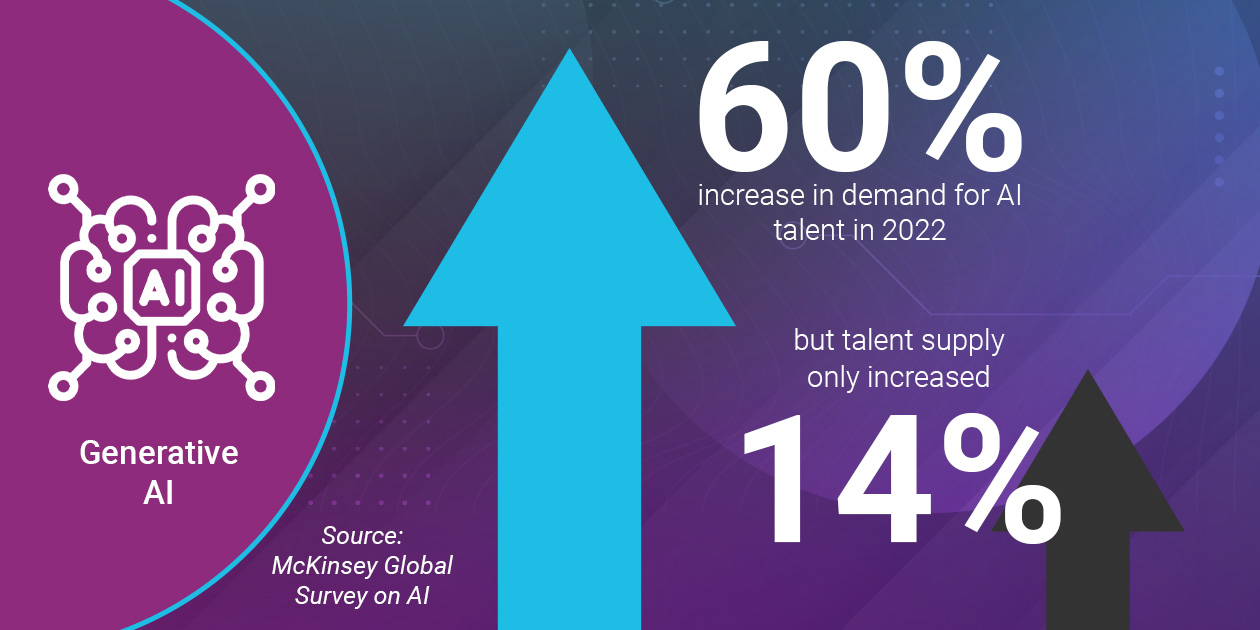
Strong data analysis skills are also crucial to AI development as is experience working with large data sets and technologies such as Hadoop, Spark, and NoSQL databases is necessary for processing and analyzing large-scale datasets. A solid understanding of statistics and mathematics is critical for building and evaluating AI models. Only a subset of software developers have these skills, making AI developers highly sought-after, particularly in the post ChatGPT wave of interest in generative AI.
2. Web3
Unfairly tarred by the crypto brush and the crazy world of NFT (nonfungible token) auctions and coin exchange collapses, Web3 has real potential. It spans a whole host of technologies that, unlike the traditional internet, which is centralized and controlled by a few large corporations, is instead designed to be decentralized, secure, and open.
It has the potential to revolutionize a wide range of industries, including finance, healthcare, education, and media. But there’s a problem…
The tech talent threat: Despite the crypto winter, Web3 companies flush with venture capital funding are still developing their platforms and struggling to attract talent. Between April 2020 and April 2022, job postings for blockchain technologies, crypto, and NFTs jumped 804%, according to jobs listings website Indeed.
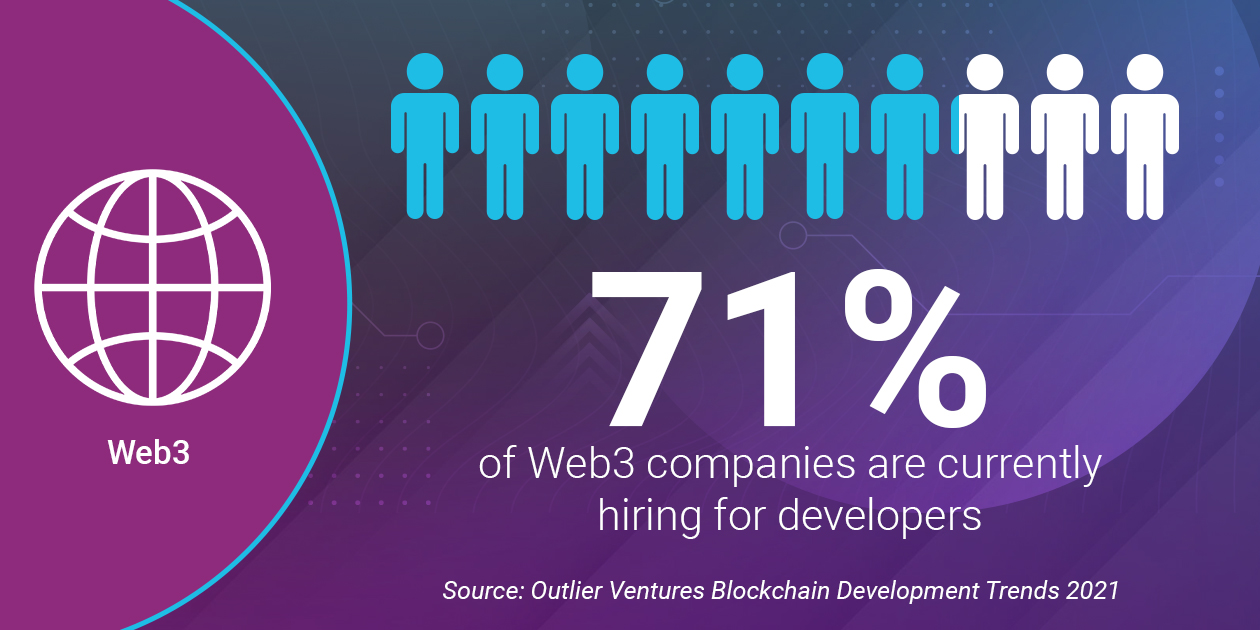
Decentralized finance systems are complex, and developers require a strong technical foundation in blockchain development, distributed systems, cryptography, web development, smart contracts, Web3 frameworks and tools, and UX/UI design. Large US corporates are dipping their toe in Web3, attempting to build out teams to let them deploy blockchain technologies, but coming up empty-handed in their search for talent.
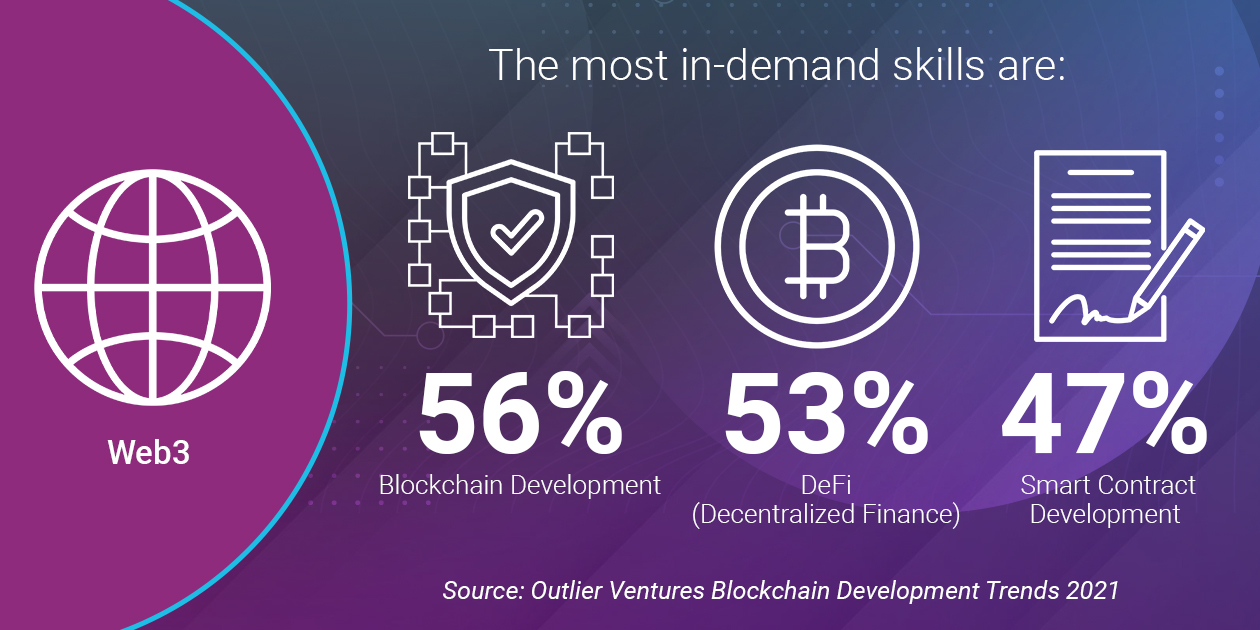
3. Metaverse
Mark Zuckerberg may have decided to let go of an additional 10,000 workers at Meta last month, but he hasn’t given up on his plan to build the Metaverse, a virtual shared space that combines elements of virtual reality, augmented reality, and the internet to create a completely new digital realm.
With the development of virtual and augmented reality technologies (AR/VR), as well as the growth of blockchain and other decentralized technologies, the idea of the metaverse is becoming increasingly feasible.
Meta is the most enthusiastic developer of metaverse environments, but games developer Roblox, Minecraft, and even Microsoft are delving into the metaverse, which is seen as a potential next step in the evolution of the internet.
The tech talent threat: While the metaverse can draw on many well-established aspects of game development, creating a virtual world we’d want to live and work in, draws on a host of other technical attributes. It incorporates elements of game design and mechanics, as well as 3D modeling and animation skills. Crucial to its success is convincing AR/VR technology - those legless avatars Meta offers on its Horizon Worlds platform aren’t going to cut it.
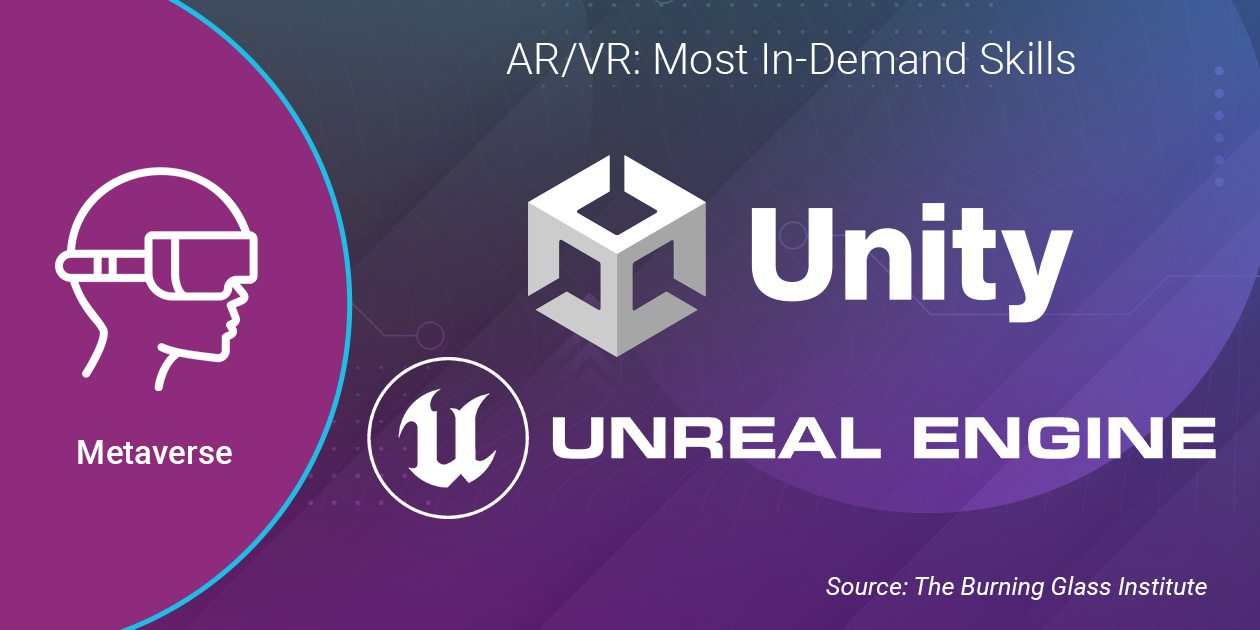
According to LinkedIn's Emerging Jobs Report, AR and VR specialists were among the top 15 emerging jobs in 2021. Gartner last year projected that demand for AR and VR talent would outstrip supply by at least 20%. The metaverse will be forever stuck in beta mode without an influx of developers dedicated to advancing the field.
4. Digital Twins
Imagine you could create a virtual replica of a car engine, a building, or even an entire city. Using real-time sensors on real world objects you could gather enough data to create a digital twin of whatever you want. What’s the point?
The digital twin can be used to simulate and predict the behavior of the physical entity, allowing for analysis and optimization of the system. This can include testing different scenarios and configurations, predicting maintenance needs and failures, and identifying opportunities for improvement. Digital twins are increasingly being used in the building industry, in engineering, aviation, transport and the energy sector.
The tech talent threat: Skill shortages are a big barrier to organizations deploying digital twins, according to McKinsey partner Kimberly Borden.
“One of the key things you need in place is a strong data infrastructure. Therefore, because of that, you will need data engineering and data science resources in order to support that data infrastructure and put the twin together,” Borden says.
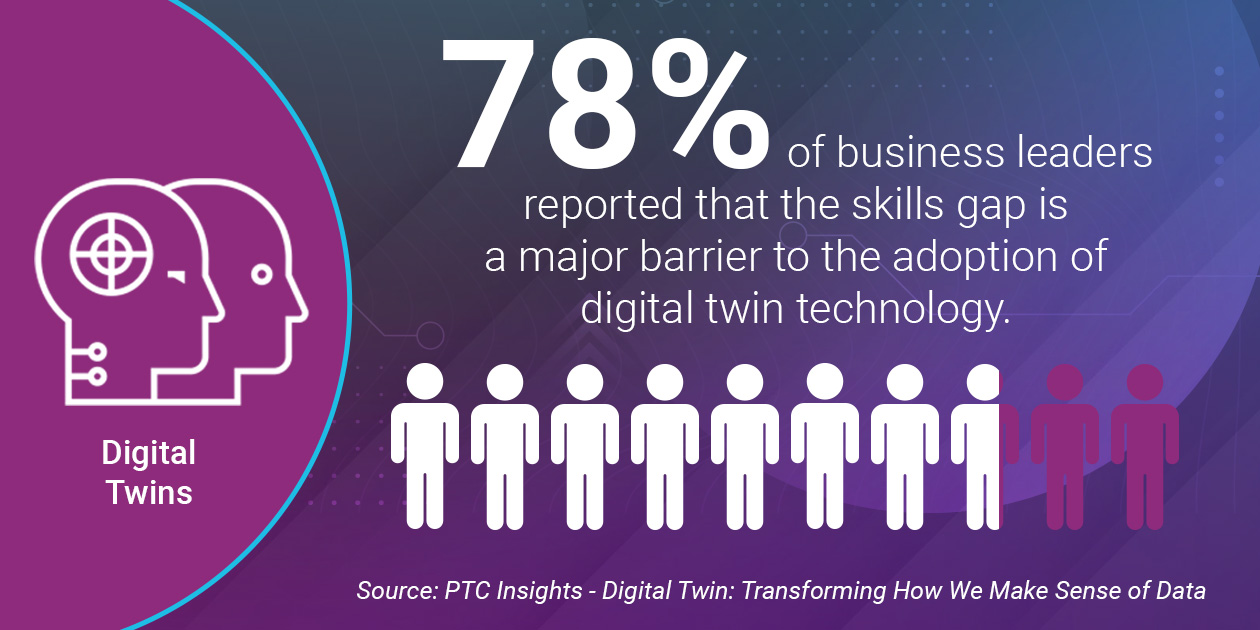
Domain knowledge also comes into play, with digital twins currently deployed in sectors such as manufacturing, healthcare, and transportation. Few companies have these skills in-house, which is why a growing number of software firms are specializing in digital twin development.
5. Robotic Process Automation
It’s been in play in numerous industries for years, but Robotic Process Automation (RPA) is a field rapidly evolving in tandem with AI. It can help businesses to streamline their operations, reduce costs, and improve efficiency.
RPA bots can be programmed to perform tasks such as data entry, data extraction, report generation, and other repetitive tasks that are time-consuming and prone to errors. These bots can work 24/7 without any breaks, reducing the time it takes to complete tasks and increasing the speed of business processes.
One of the key benefits of RPA is that it can be easily integrated with existing systems and applications. This means that businesses can automate processes without the need for significant changes to their existing systems or infrastructure.
The tech talent threat: Developers need to understand workflow automation, business process management, and process mapping. They need to be familiar with RPA tools and frameworks, such as UiPath, Blue Prism, and Automation Anywhere.
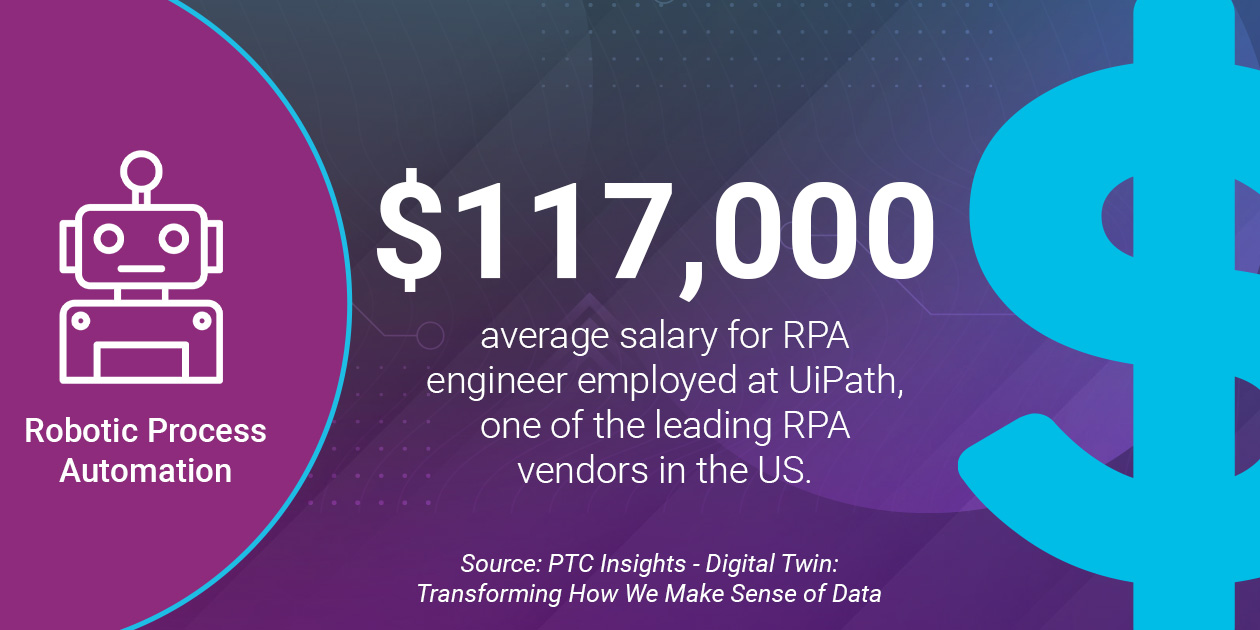
AI and machine learning come into play in intelligent RPA systems that can learn from data and optimize processes. Development in this area is complex and experienced RPA experts are worth their weight in gold. If the automation boom is to deliver its promised productivity gains, we’ll need many more RPA gurus.
These key emerging technologies are in hot demand in 2023, but is the tech talent shortage leaving your business on the sidelines?
Accelerance has a worldwide network of pre-vetted development firms able to shoulder the load.
Get in touch with an Accelerance consultant to find out how we can help you clear your digital transformation bottlenecks and put emerging tech to good use.
Recently Published Articles
View All Posts
Best Practices
January 7, 2025 | Accelerance Research Team
Tech Talent Series Part 1: How the Tech Talent Shortage Could Derail Your Plans for Emerging Tech
Knowledge
June 7, 2022 | Lisa Morrell
Don’t Panic: Making Sense of the Tech Slowdown Headlines
Best Practices
April 26, 2022 | Lisa Morrell
EXECUTIVE SPOTLIGHT: Making the Shift to Tech Skills Hyperspecialization
Subscribe to email updates
Stay up-to-date on what's happening at this blog and get additional content about the benefits of subscribing.

